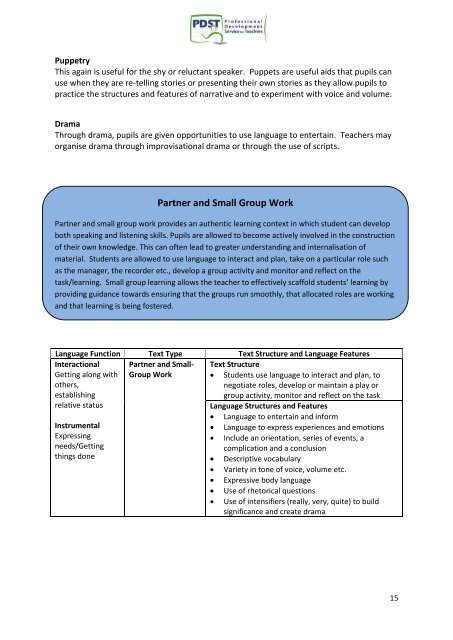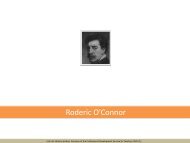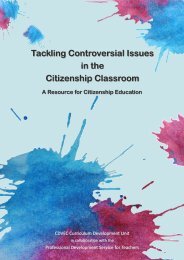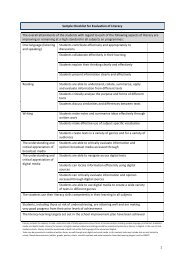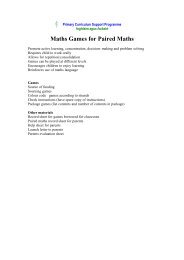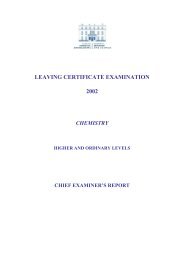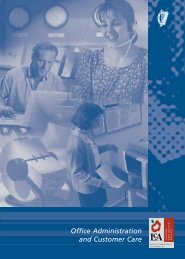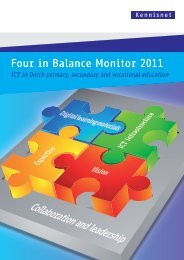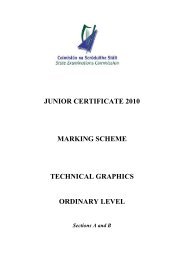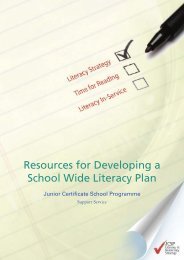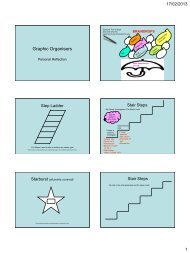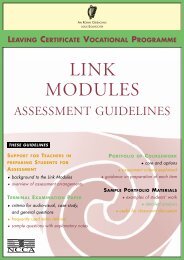Five Components of Effective Oral Language Instruction - PDST
Five Components of Effective Oral Language Instruction - PDST
Five Components of Effective Oral Language Instruction - PDST
You also want an ePaper? Increase the reach of your titles
YUMPU automatically turns print PDFs into web optimized ePapers that Google loves.
Puppetry<br />
This again is useful for the shy or reluctant speaker. Puppets are useful aids that pupils can<br />
use when they are re-telling stories or presenting their own stories as they allow pupils to<br />
practice the structures and features <strong>of</strong> narrative and to experiment with voice and volume.<br />
Drama<br />
Through drama, pupils are given opportunities to use language to entertain. Teachers may<br />
organise drama through improvisational drama or through the use <strong>of</strong> scripts.<br />
<strong>Language</strong> Function Text Type Text Structure and <strong>Language</strong> Features<br />
Interactional<br />
Getting along with<br />
others,<br />
establishing<br />
relative status<br />
Instrumental<br />
Expressing<br />
needs/Getting<br />
things done<br />
Partner and Small Group Work<br />
Partner and small group work provides an authentic learning context in which student can develop<br />
both speaking and listening skills. Pupils are allowed to become actively involved in the construction<br />
<strong>of</strong> their own knowledge. This can <strong>of</strong>ten lead to greater understanding and internalisation <strong>of</strong><br />
material. Students are allowed to use language to interact and plan, take on a particular role such<br />
as the manager, the recorder etc., develop a group activity and monitor and reflect on the<br />
task/learning. Small group learning allows the teacher to effectively scaffold students’ learning by<br />
providing guidance towards ensuring that the groups run smoothly, that allocated roles are working<br />
and that learning is being fostered.<br />
Partner and Small-<br />
Group Work<br />
Text Structure<br />
� Students use language to interact and plan, to<br />
negotiate roles, develop or maintain a play or<br />
group activity, monitor and reflect on the task<br />
<strong>Language</strong> Structures and Features<br />
� <strong>Language</strong> to entertain and inform<br />
� <strong>Language</strong> to express experiences and emotions<br />
� Include an orientation, series <strong>of</strong> events, a<br />
complication and a conclusion<br />
� Descriptive vocabulary<br />
� Variety in tone <strong>of</strong> voice, volume etc.<br />
� Expressive body language<br />
� Use <strong>of</strong> rhetorical questions<br />
� Use <strong>of</strong> intensifiers (really, very, quite) to build<br />
significance and create drama<br />
15


